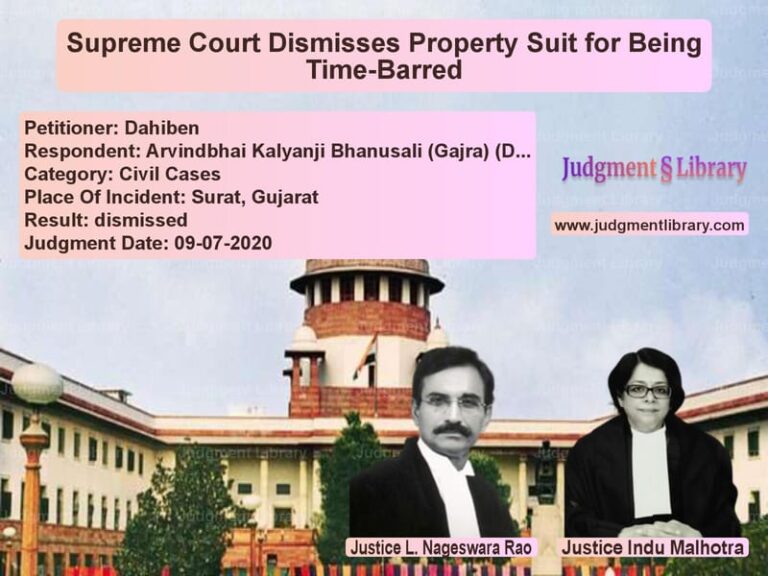SEBI Penalties and Judicial Review: Supreme Court’s Analysis on Discretion in Financial Regulations
The Supreme Court of India recently addressed a crucial legal question concerning the interpretation of penalties imposed under the Securities and Exchange Board of India Act, 1992 (SEBI Act). The case involved Siddharth Chaturvedi, Ankur Chaturvedi, and Jay Kishore Chaturvedi against the Securities and Exchange Board of India (SEBI). The central issue revolved around the interplay between Section 15A (as amended in 2002) and Section 15J of the SEBI Act.
The Court’s ruling holds significant implications for market participants, adjudicating officers, and investors, as it clarifies the scope of discretion available while imposing penalties for regulatory infractions.
Background of the Case
The appellants made purchases of shares in Brijlaxmi Leasing and Finance Company between October and December 2012. Subsequently, SEBI issued a show cause notice on June 16, 2014, under Rule 4(1) of the Securities and Exchange Board of India (Procedure for Holding Inquiry and Imposing Penalty by Adjudicating Officer) Rules, 1995. The notice alleged violations of Regulations 13(4), 13(4A), and 13(5) of the SEBI (Prohibition of Insider Trading) Regulations, 1992.
The appellants responded on August 13, 2014, arguing that the transactions were made without any intention to violate the regulations. They contended that the total transaction value did not exceed Rs. 55,000 and that no disproportionate gain or investor loss occurred.
Arguments by the Petitioners
- The appellants contended that their default, if any, was purely technical and did not warrant a penalty.
- They asserted that no unfair advantage was gained, nor was any loss caused to investors.
- The penalty imposed was disproportionate and did not align with the principles of equity.
- They emphasized that Section 15J of the SEBI Act required due consideration of factors such as disproportionate gains and repetitive violations before imposing penalties.
Arguments by SEBI (Respondents)
- SEBI maintained that the violations were clear and that the regulations made penalty imposition mandatory.
- The adjudicating officer imposed penalties of Rs. 5 lakhs, Rs. 7 lakhs, and Rs. 11 lakhs in three separate cases, which SEBI deemed justified.
- SEBI relied on a previous judgment in SEBI vs. Roofit Industries Ltd., stating that penalties under Section 15A were obligatory, and no discretionary reduction was permissible.
- It was argued that allowing discretion in penalty imposition would weaken regulatory enforcement.
Supreme Court’s Observations
The Supreme Court extensively analyzed Sections 15A and 15J of the SEBI Act, along with precedent rulings. The key aspects of the judgment were:
- Statutory Interpretation of Section 15A: The Court examined whether the 2002 amendment removed all discretion in penalty imposition.
- Role of Section 15J: The Court questioned whether the factors mentioned in Section 15J were exhaustive or if other relevant considerations could also apply.
- Judicial Precedent: The Court reviewed prior decisions, including SEBI vs. Roofit Industries Ltd., where a strict approach to penalties was endorsed.
- Constitutional Considerations: The Court emphasized that financial penalties must not be excessive or arbitrary, as they impact fundamental rights.
Key Excerpts from the Judgment
“We find it difficult to accept that Section 15A, as amended in 2002, can entirely eclipse the discretionary power under Section 15J. The absence of an explicit ‘notwithstanding’ clause suggests that a harmonious interpretation must prevail.”
“If we were to read Section 15A in isolation, without regard to Section 15J, it could lead to unreasonable and excessive penalties that do not align with fundamental principles of justice.”
Final Judgment and Its Implications
The Supreme Court ruled that:
- The matter required reconsideration by a larger bench to provide authoritative guidance on the interplay between Sections 15A and 15J.
- Until a final ruling was issued, interim relief granted to the appellants would continue.
- The adjudicating officers must exercise caution and ensure proportionality while imposing penalties.
Conclusion
This case marks a significant development in securities law enforcement in India. The Supreme Court’s decision to refer the matter to a larger bench underscores the complexity of financial regulations and the need for balanced enforcement.
The ruling is expected to have far-reaching implications for future cases involving SEBI penalties and the interpretation of statutory provisions governing regulatory compliance.
Don’t miss out on the full details! Download the complete judgment in PDF format below and gain valuable insights instantly!
Download Judgment: Siddharth Chaturvedi vs Securities and Excha Supreme Court of India Judgment Dated 14-03-2016-1741853953324.pdf
Direct Downlaod Judgment: Direct downlaod this Judgment
See all petitions in Corporate Compliance
See all petitions in Judgment by Kurian Joseph
See all petitions in Judgment by Rohinton Fali Nariman
See all petitions in partially allowed
See all petitions in Remanded
See all petitions in supreme court of India judgments March 2016
See all petitions in 2016 judgments
See all posts in Corporate and Commercial Cases Category
See all allowed petitions in Corporate and Commercial Cases Category
See all Dismissed petitions in Corporate and Commercial Cases Category
See all partially allowed petitions in Corporate and Commercial Cases Category







